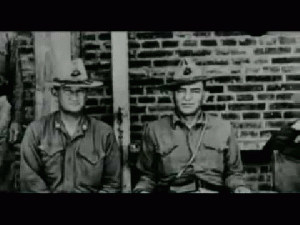Cross-posted from Future of Freedom Foundation
In light of this record, Butler presumably shocked a good many people when in 1935 -- as a second world war was looming -- he wrote in the magazine Common Sense:
"I spent 33 years and four months in active military service and during that period I spent most of my time as a high class muscle man for Big Business, for Wall Street and the bankers. In short, I was a racketeer, a gangster for capitalism [corporatism]. I helped make Mexico and especially Tampico safe for American oil interests in 1914. I helped make Haiti and Cuba a decent place for the National City Bank boys to collect revenues in. I helped in the raping of half a dozen Central American republics for the benefit of Wall Street. I helped purify Nicaragua for the International Banking House of Brown Brothers in 1902-1912. I brought light to the Dominican Republic for the American sugar interests in 1916. I helped make Honduras right for the American fruit companies in 1903. In China in 1927 I helped see to it that Standard Oil went on its way unmolested. Looking back on it, I might have given Al Capone a few hints. The best he could do was to operate his racket in three districts. I operated on three continents."
That same year he published a short book with the now-famous title War Is a Racket, for which he is best known today. Butler opened the book with these words:
"War is a racket. It always has been.
"It is possibly the oldest, easily the most profitable, surely the most vicious. It is the only one international in scope. It is the only one in which the profits are reckoned in dollars and the losses in lives."
He followed this by noting: "For a great many years, as a soldier, I had a suspicion that war was a racket; not until I retired to civil life did I fully realize it. Now that I see the international war clouds gathering, as they are today, I must face it and speak out."
Butler went on to describe who bears the costs of war -- the men who die or return home with wrecked lives, and the taxpayers -- and who profits -- the companies that sell goods and services to the military. (The term military-industrial complex would not gain prominence until 1961, when Dwight Eisenhower used it in his presidential farewell address. See Nick Turse's book The Complex: How the Military Invades Our Everyday Lives.)
Writing in the mid-1930s, Butler foresaw a U.S. war with Japan to protect trade with China and investments in the Philippines, and declared that it would make no sense to the average American:
"We would be all stirred up to hate Japan and go to war -- a war that might well cost us tens of billions of dollars, hundreds of thousands of lives of Americans, and many more hundreds of thousands of physically maimed and mentally unbalanced men.
"Of course, for this loss, there would be a compensating profit -- fortunes would be made. Millions and billions of dollars would be piled up. By a few. Munitions makers. Bankers. Ship builders. Manufacturers. Meat packers. Speculators. They would fare well....
"But what does it profit the men who are killed? What does it profit their mothers and sisters, their wives and their sweethearts? What does it profit their children?
"What does it profit anyone except the very few to whom war means huge profits?"
Noting that "until 1898 [and the Spanish-American War] we didn't own a bit of territory outside the mainland of North America," he observed that after becoming an expansionist world power, the U.S. government's debt swelled 25 times and "we forgot George Washington's warning about 'entangling alliances.' We went to war. We acquired outside territory."
"It would have been far cheaper (not to say safer) for the average American who pays the bills to stay out of foreign entanglements. For a very few this racket, like bootlegging and other underworld rackets, brings fancy profits, but the cost of operations is always transferred to the people -- who do not profit."
Butler detailed the huge profits of companies that sold goods to the government during past wars and interventions and the banks that made money handling the government's bonds.
(Note: You can view every article as one long page if you sign up as an Advocate Member, or higher).






